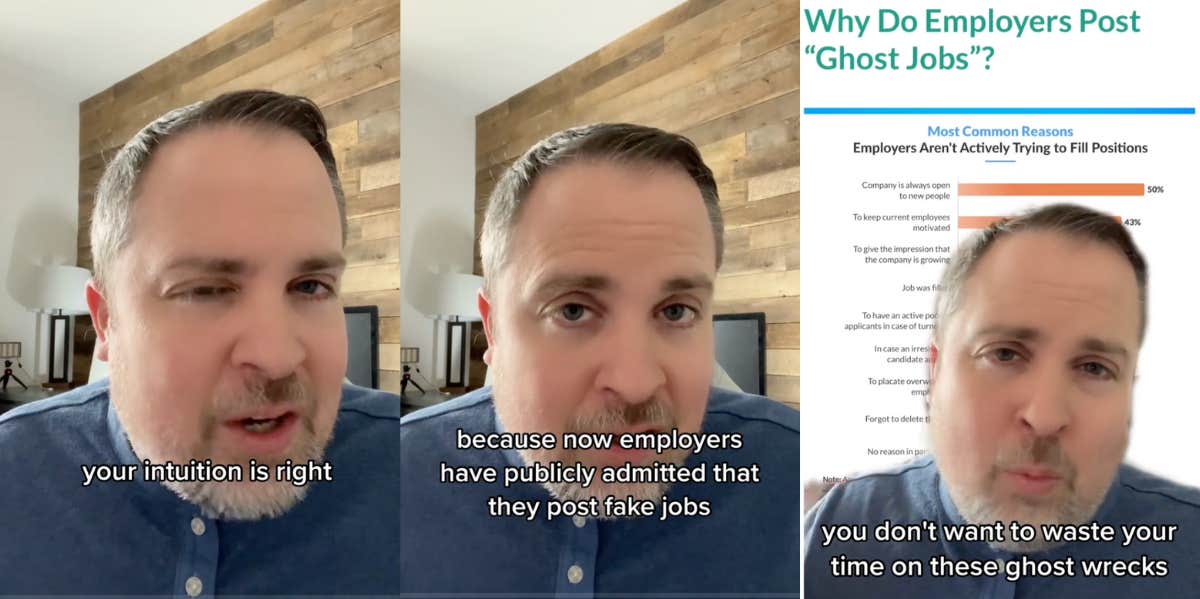Companies Are Posting Fake 'Ghost Jobs' To Gather Resumes And Experts Say This Is Why Job-Hunting Is Now A Nightmare
If you've ever felt like your resume was disappearing into a void? Turns out you're absolutely correct.
 @alifeafterlayoff / TikTok
@alifeafterlayoff / TikTok Job-hunting has always been... well, a bit of a nightmare. It's tedious, nerve-wracking, and an opaque process at best. But a recent survey of hiring managers reveals that it's far more opaque than most of us realize. You're not imagining things — the job search process really is getting harder and harder.
A survey reveals companies are posting fake 'ghost jobs' on job search boards.
It's not your imagination and you're not necessarily doing anything wrong in your job search. There is a reason there have been so many stories recently, for instance, about people applying to hundreds of jobs and getting nowhere.
As veteran recruiter and job search consultant Bryan Creely explains in the video below, several factors are converging to make the job-hunting process more of a nightmare than ever before, but one of them is perhaps far more shocking than the others.
In a recent survey of more than 1,000 hiring managers done by investment and wealth management firm Clarity Capital, tons of companies openly admitted to a practice that will confirm the suspicions of many job applicants—a lot of those jobs you're applying to are completely fake.
Companies are posting fake ghost jobs to gather resumes for the future, give the illusion of growth and manipulate employee morale.
Fifty percent of the companies said they post fake ghost jobs, including leaving up ads for expired or already filled jobs, simply because they're "always open to new people," while 37% said they do so to gather resumes in case of future turnover.
In a TikTok, Creely likened these practices to window shopping for employees.
But the other reasons are unsettling. Forty-three percent said they post fake ghost jobs to "keep employees motivated." It's hard to imagine how posting fake jobs would result in motivation unless it's explicitly negative motivation — like, say, manipulating people into thinking their jobs are about to be made redundant and they'll soon be facing a layoff.
Creely also theorized that it's a means of keeping overworked employees from quitting — fake ghost ads give the impression that the company is growing and relief is on the horizon as more staff will soon be on-board to take the extra workload.
And speaking of growth, another 43% said their companies are posting fake ghost jobs to give the overall impression that the company is growing — which seems like it has to be ethically and legally dubious at best. Companies run aground of the law and leaders end up in jail for misrepresenting a company's value, after all.
Technology, the rise of AI and recruiting staffing shortages are making a mess of things too.
As a recent report in Time revealed, many pandemic-related changes, like "one-way interviews" in which candidates create videos of themselves answering questions, have stuck around now that the pandemic has abated.
But rather than streamline the process, they produce an inordinate amount of content that recruiting and hiring staff then have to sift through — staffs that were subject to major lay-offs during the height of the pandemic and which in some cases have only deepened as new software developments and the integration of artificial intelligence have been making recruiting staff less necessary.
Except that they don't really — as Time reports, those staffing shortages mean there are not only fewer people to sift through all the extra content these innovations create but that hiring and interviewing now often fall to managers with no experience in the process.
Roll this all together, and it creates a perfect storm of a wildly impersonal and demoralizing job search experience — your resume really is going into an often AI-generated black hole — and a hiring process that has now reached an all-time high of 44 days for those applicants do actually make it in front of a decision maker.
So how do we deal with this hellish scenario? The old-fashioned answer nobody wants to hear — Creely recommends leveraging networking and social media platforms, especially LinkedIn, as much as possible as a way of cutting through all this mess. That's probably cold comfort to anyone currently circling the drain of the job-hunting process, but hey, at least you know you're not the only one!
John Sundholm is a news and entertainment writer who covers pop culture, social justice and human interest topics.
